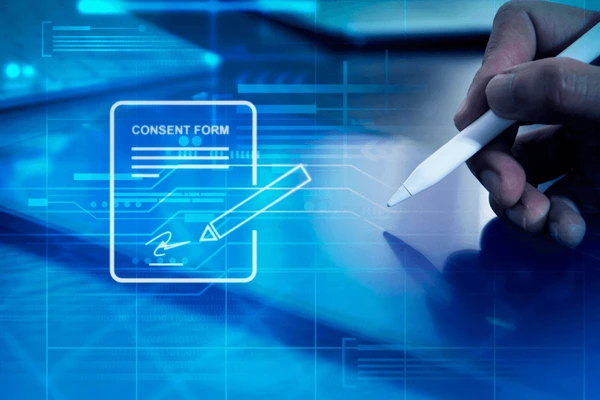GDPR Compliance Checklist for Businesses
Table of Contents:
- Introduction to GDPR and Why It Matters
- Key Principles of GDPR Compliance
- GDPR Compliance Checklist for Businesses
- Common GDPR Mistakes Businesses Make
- 5 Key Questions Answered About GDPR Compliance Checklist
- Practical Examples of GDPR in Action
- How GDPR Compliance Improves Business Value
- Final Thoughts and Action Steps
- Call to Action – Partner with Excell
Introduction to GDPR and Why It Matters
The General Data Protection Regulation (GDPR) has redefined the global conversation about privacy, transparency, and accountability. Enforced since May 25, 2018, this law applies to all businesses that handle the personal data of individuals in the European Union (EU) and the European Economic Area (EEA). Even if your company is based outside Europe, you must comply if you serve EU customers or track their behavior.
For businesses, the GDPR isn’t just about avoiding penalties. It’s about:
- Building trust with customers who want transparency.
- Reducing risks of cyberattacks and data misuse.
- Differentiating yourself in a competitive market by showing your business values privacy.
Fines under the GDPR are severe, ranging from up to €20 million or 4% of the company’s global annual turnover (whichever is greater). But beyond financial penalties, non-compliance can lead to reputational damage that is difficult to recover from.
That’s why every company, big or small, should implement a structured GDPR compliance checklist. This ensures consistency, clarity, and readiness in case regulators or customers question your practices.
Key Principles of GDPR Compliance
The General Data Protection Regulation (GDPR) is not just a list of technical rules; it is built around seven key principles that guide how businesses should handle personal data. These principles provide the ethical and legal foundation for GDPR compliance and are designed to ensure that individuals remain in control of their personal data while organizations process it responsibly.
Let’s explore each principle in detail with practical business applications and examples.
1. Lawfulness, Fairness, and Transparency
This principle ensures that businesses act legally, ethically, and openly when processing personal data.
- Lawfulness means having a legal basis for processing data. GDPR identifies six lawful bases: consent, contract, legal obligation, vital interests, public task, and legitimate interests. For example, an online shop processing payment details is lawful under “contractual necessity.”
- Fairness means avoiding practices that mislead or harm individuals. For example, secretly selling customer email addresses to third parties would be unfair.
- Transparency requires businesses to clearly explain how they collect, use, store, and share personal data. This typically happens through privacy notices or terms and conditions.
A SaaS company collects email addresses for user accounts. Under GDPR, they must explain (in plain language) why they collect emails (e.g., account verification, communication) and cannot use those addresses for unrelated marketing unless explicit consent is obtained.
2. Purpose Limitation
Data should only be collected for specific, clear, and legitimate purposes. Businesses cannot collect data on a “just in case” basis or repurpose it later without a valid legal basis.
- Collect data only for defined reasons (e.g., delivering products, providing customer support).
- If the data needs to be used for another purpose, businesses must either obtain new consent or confirm that the new purpose is compatible with the original one.

If a travel agency collects passport details to book flights, it cannot later use that data to promote unrelated holiday packages without obtaining the customer’s consent.
3. Data Minimization
This principle enforces the idea of collecting only what’s necessary. Businesses should avoid collecting excessive or irrelevant data.
- Do not gather more data than you actually need.
- Limit the scope of information fields in forms or systems.
- Regularly review and delete unnecessary data.
A job application form should only request details relevant to hiring (work experience, qualifications). Requesting unrelated data, such as marital status or social media passwords, would violate this principle.
4. Accuracy
Data must be kept accurate and up-to-date. Inaccurate or outdated personal data can lead to mistakes, harm individuals, and undermine trust.
- Develop systems that enable individuals to update or correct their own data.
- Conduct regular audits to ensure records are correct.
- Delete or correct data that is found to be inaccurate.
A bank must ensure customer addresses are updated correctly. Sending sensitive bank statements to an outdated address could expose private information to unauthorized parties, breaching GDPR.
5. Storage Limitation
Personal data should be kept only as long as necessary for the purposes for which it was collected. Holding onto data indefinitely creates unnecessary risks.
- Define clear retention policies (e.g., customer records stored for 5 years).
- Delete or anonymize data after the retention period.
- Clearly communicate your retention practices in your privacy policy.
An e-commerce store may retain transaction records for accounting purposes for up to 7 years (as legally required), but should not keep marketing data of inactive customers indefinitely.
6. Integrity and Confidentiality (Security)
Also known as the security principle, this requires businesses to protect personal data against unauthorized access, accidental loss, or damage.
- Implement technical measures such as encryption, firewalls, and secure servers.
- Implement organizational measures, such as staff training, access controls, and incident response plans, to enhance security and ensure a robust security posture.
- Regularly review and test security systems to address vulnerabilities.
A healthcare clinic storing patient medical records must use encrypted databases, restrict staff access to only those involved in treatment, and ensure regular backups to prevent data loss.
7. Accountability
Accountability under the GDPR means businesses must not only comply with the rules but also demonstrate compliance if requested by regulators.
- Maintain records of processing activities (RoPA).
- Appoint a Data Protection Officer (DPO) if required.
- Conduct regular GDPR audits and staff training.
- Be prepared to demonstrate compliance with supervisory authorities.
GDPR Compliance Checklist for Businesses

- Identify all personal data you collect: names, emails, IP addresses, purchase history, etc.
- Track where this data is stored (in databases, spreadsheets, or cloud systems).
- Understand how data flows between departments and external vendors.
- Maintain a Record of Processing Activities (RoPA) as required under Article 30 of GDPR.
📌 Example: A marketing team gathers email addresses for newsletters. These must be documented, including how they’re collected, stored, and whether consent was given.
2. Lawful Basis for Processing
Every data activity must be justified under GDPR. The six lawful bases are:
- Consent
- Contractual necessity
- Legal obligation
- Vital interests (e.g., saving a life)
- Public task
- Legitimate interests
📌 Example: Collecting payment details falls under contract necessity, while sending promotional emails requires explicit consent.
3. Privacy Notices and Transparency
- Publish clear and accessible privacy policies on websites and apps.
- Use plain, user-friendly language. Avoid jargon.
- Include details on what data you collect, how it’s used, who it’s shared with, and how long you keep it.
- Update notices regularly to reflect changes.
📌 Example: A retail website must inform customers if their purchase data will be shared with delivery partners.
4. Data Subject Rights
GDPR gives individuals powerful rights:
- Right of Access (see what’s held about them)
- Right to Rectification (correct errors)
- Right to Erasure (“Right to be Forgotten”)
- Right to Restrict Processing
- Right to Data Portability
- Right to Object (e.g., stop marketing emails)
📌 Example: If a former client requests deletion of their account and data, your team must have a straightforward process to comply quickly.
5. Security Measures
Data protection isn’t just about policies; it’s about cybersecurity. Businesses should:
- Encrypt sensitive information (both at rest and in transit).
- Use role-based access controls.
- Implement regular patching and updates.
- Conduct penetration tests and vulnerability scans.
📌 Example: If you run an e-commerce store, encrypt credit card data using PCI DSS standards.
6. Data Breach Response Plan
Under GDPR, if a breach occurs:
- Notify the supervisory authority within 72 hours.
- Inform affected individuals if their rights and freedoms are at risk.
- Document every violation, even minor ones.
📌 Example: A stolen company laptop containing unencrypted customer data counts as a reportable breach.
7. Appointing a Data Protection Officer (DPO)
Some businesses must appoint a DPO, especially if they:
- Handle large-scale monitoring (e.g., ad tech companies tracking user behavior).
- Process sensitive categories like health data.
The DPO ensures compliance and acts as a liaison with regulators.
8. Vendor and Third-Party Compliance
Many companies rely on cloud providers, CRM tools, or marketing agencies to support their operations. Under GDPR:
- You must vet their data handling practices.
- Sign Data Processing Agreements (DPAs).
- Ensure ongoing monitoring of compliance.
📌 Example: If your email service provider mishandles customer data, you are still liable.
9. Staff Training and Awareness

- Recognizing phishing emails.
- Handling sensitive data.
- Following the company’s privacy policies.
- Reporting suspicious activity.
Common GDPR Mistakes Businesses Make
Even with a gdpr compliance checklist, many companies stumble. Common mistakes include:
- Using pre-checked consent boxes (invalid under GDPR).
- Treating compliance as “one and done” instead of ongoing.
- Forgetting to review vendor contracts.
- Storing data indefinitely with no retention limits.
- Failing to train new hires on privacy practices.
5 Key Questions About GDPR Compliance Checklist
Because it provides a structured approach, without one, businesses risk missing key steps, such as breach notifications or lawful basis documentation. A checklist keeps you accountable and audit-ready.
2. Does GDPR apply to businesses outside the EU?
Yes. If you sell to or monitor EU citizens, GDPR applies regardless of your company’s location. For example, a U.S.-based e-commerce store shipping to Germany must comply with these regulations.
3. What happens if my business fails to comply with GDPR?
Consequences include fines, lawsuits, reputational harm, and loss of customer trust. In 2023, Meta was fined €1.2 billion for violating GDPR data transfer rules, proving that regulators take enforcement seriously.
4. How often should I review my GDPR compliance checklist?
At least once a year, but also after:
- Expanding into new markets.
- Launching new products.
- Adopting new technologies.
- Partnering with third-party vendors.
5. Is appointing a DPO mandatory for every business?
Practical Examples of GDPR in Action
- Healthcare Company – Hospitals must safeguard patient records. Breaches can result in severe fines due to the sensitive data categories involved.
- E-Commerce Store – Online shops need explicit consent before sending marketing emails.
- Recruitment Agency – Candidate CVs must not be stored indefinitely. Once a job is filled, data retention policies kick in.
- Tech Startup – App developers using tracking cookies must ensure users’ consent before enabling them.
How GDPR Compliance Improves Business Value
Many companies view GDPR as just another regulatory burden, something they must endure to avoid fines. However, businesses that adopt GDPR as part of their strategy often find that compliance yields tangible benefits far beyond the legal protection it provides. In reality, GDPR can be a competitive advantage that improves customer trust, strengthens operations, and creates growth opportunities.
Let’s explore how GDPR compliance translates into business value:
1. Boosts Trust and Strengthens Brand Reputation
Trust is the currency of the modern digital economy. Customers are becoming increasingly privacy-conscious and selective about the companies with which they engage. GDPR compliance demonstrates that your business:
- Respects customer privacy and values their personal data.
- Is transparent about how information is used.
- Can be relied upon to protect sensitive details.
A strong reputation for data protection not only enhances customer retention but also facilitates the acquisition of new customers. People are more likely to sign up for services, share personal details, and make repeat purchases when they know their data is safe.
📌 Example: Apple has positioned itself as a privacy-first brand. While not explicitly a GDPR case study, its emphasis on privacy aligns with GDPR principles and has become a core selling point that differentiates it from competitors.
2. Reduces Financial and Legal Risks
Data breaches and compliance failures are expensive. Under the GDPR, penalties can be as high as €20 million or 4% of the company’s annual global turnover, whichever is greater. Beyond fines, breaches often result in:
- Class-action lawsuits from affected individuals.

- Compensation costs to victims of data misuse.
- Operational disruption from investigating and repairing the breach.
- Reputational damage that reduces customer loyalty.
By proactively implementing GDPR safeguards, businesses minimize the risk of breaches and costly penalties. Prevention is always cheaper than reaction. Investing in compliance frameworks, such as encryption, audits, and training, may seem expensive upfront, but it often saves millions in the long run.
📌 Example: In 2019, British Airways was fined £20 million after a cyberattack compromised the personal data of over 400,000 customers. Stronger GDPR compliance measures could have mitigated both the breach and the penalty.
3. Improves Efficiency Through Data Minimization
GDPR encourages organizations to adopt data minimization, collecting and storing only what is necessary. This principle doesn’t just protect privacy; it also improves business efficiency:
- Leaner databases mean lower storage costs.
- Fewer unnecessary records reduce data management complexity.
- Focused data enhances decision-making quality, as teams analyze clean and relevant datasets.
Instead of hoarding massive amounts of irrelevant information, GDPR pushes companies to refine their data strategy. This leads to more streamlined operations and more intelligent insights.
📌 Example: A retail company previously stored extensive customer information, including irrelevant demographic details. After implementing GDPR practices, it trimmed its database to focus only on purchase history and preferences. As a result, its marketing campaigns became more personalized and effective.
4. Enables Global Alignment and Regulatory Readiness
GDPR set a global benchmark for data protection. Since its enforcement, many other regions have introduced similar privacy laws:
- CCPA (California Consumer Privacy Act) in the U.S.
- LGPD (Lei Geral de Proteção de Dados) in Brazil.
- POPIA (Protection of Personal Information Act) in South Africa.
Businesses that comply with GDPR already have the systems, policies, and culture to meet these other frameworks. Instead of scrambling to adjust for each new regulation, GDPR-compliant businesses enjoy a first-mover advantage, saving time and resources.
📌 Example: A SaaS company operating globally found it easier to expand into California and Brazil after already implementing GDPR compliance, since many of the requirements overlapped.
Final Thoughts and Action Steps
Action steps to get started today:
- Audit your data.
- Identify lawful bases.
- Update your privacy notices.
- Implement robust security measures.
- Train your staff regularly.
Call to Action – Partner with Excell

👉 Don’t risk fines or customer trust. Contact us today and Book your free discovery call to get done for your services.
Contact us:
6420 Richmond Ave., Ste 470
Houston, TX, USA
Phone: +1 832-850-4292
Email: info@excellofficial.com







